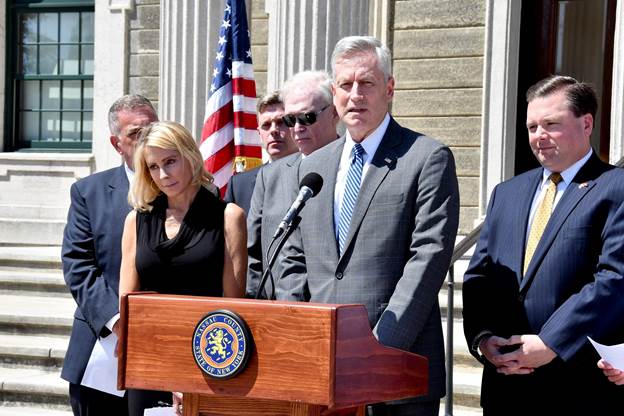
Nassau County Republican legislators introduced a package of assessment changes on Monday that does not include the ratification of the five-year phase-in approved by the state Legislature.
The slate of proposed reforms includes a requirement for the appointed Nassau County assessor to reside within Nassau County. Nassau County Assessor David Moog is a New York City resident.
Presiding Officer Richard Nicolello (R-New Hyde Park) said the changes included in the “Assessment Bill of Rights” are based on what Republican lawmakers heard from thousands of taxpayers at meetings and hearings across the county.
Other changes include restricting home inspections conducted by the county Department of Assessment, limiting the Nassau County executive’s ability to change the level of assessment used without an amendment approved by the county Legislature, requiring the county executive’s office to mail grievance results to homeowners, mandating the mailing of new tax impact notices with a homeowner’s property tax burden using the final assessed value and the proposed five-year phase-in, requiring the Nassau County assessor to hold hearings in each town and city in the county and demanding the disclosure of the formula used to determine assessed values.
Nicolello said these measures will help ensure that home assessments are the result of a fair and transparent process. They are expected to be voted on before summer’s end.
As for the five-year phase-in of property tax increases and decreases, the presiding officer said that legislators are still reviewing the legislation but Nassau County Executive Laura Curran’s office has failed to provide additional information and post updated tax impact notices as requested.
“Our position is this: many of the problems that were created by this assessment process were created because it was done in a rushed fashion,” he said. “We are not going to make the same mistake … we are not going to pass something that we are going to have to turn around and change in a couple of weeks as the administration has had to do repeatedly.”
Analysis from Newsday found the 2020-21 tentative assessment roll to be fair and accurate but Nicolello said that a different story is being told by the residents.
“Obviously, Newsday has its own information, its own point of view but we also speak to our residents,” he said. “The massive amount of people we spoke to say this is not accurate.”
He said that residents have said that factors used to determine assessed values, “such as neighborhood value that has no explanation, have made it arbitrary and capricious.”
He said the ultimate testament to its inaccuracy is the unprecedented number of grievances that have been filed.
It is an election year for the Nassau County Legislature, which has a Republican majority of 11-8. Before Curran initiated the reassessment after she came to office in January 2018, the county assessment roll had been frozen for nearly a decade by previous Nassau County Executive Edward Mangano.
Taxpayers who challenged their assessments were able to win reductions, shifting the tax burden to those who did not file grievances.
“This is the height of hypocrisy,” Christine Geed, Curran’s communications director, said in an email. “The GOP Majority fiddled while Mangano burned a corrupt assessment system to the ground. This is the Majority that froze the assessment roll 10 years ago and began unfairly shifting property taxes to one-half of the County’s taxpayers.”
Geed said the Curran administration has hosted 57 community meetings on assessment, three in each legislative district, and currently, the administration is hosting property tax exemption workshops.
“We want this legislature to do their job,” she said. “And stop fearmongering during an election year.”






